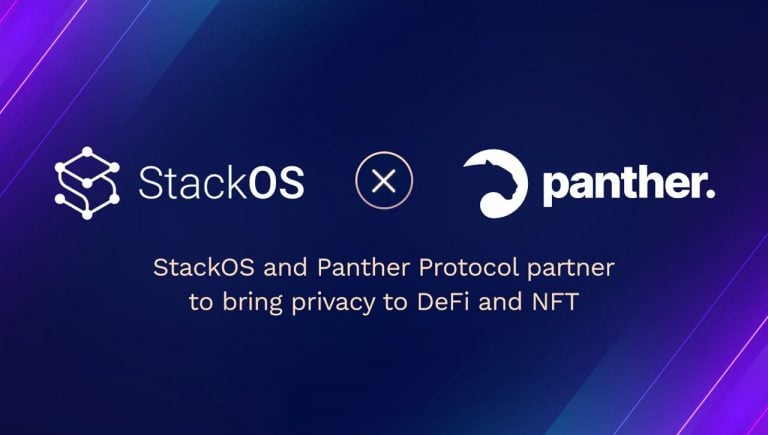Faith Rekindled: El Salvador B...
25 February 2025 | 5:30 pm

PRESS RELEASE. Panther Protocol has joined forces with StackOS, a decentralized cloud protocol, to deliver privacy and data protection tools.
As a meta-protocol focused on end-to-end privacy for any digital asset, Panther is of great interest to virtually all DeFi users looking to benefit from personal financial data protection and confidential cryptocurrency transactions. Panther zAssets are 1:1 backed representations of the underlying assets they represent, offering users all of the benefits of private transactions in this emerging asset type.
Under the Partnership agreement, Panther Protocol’s DeFi privacy services will be deployed on StackOS’ decentralized cloud. This is easily done in minutes through its easy-to-use interface after the applications have been containerized. Applications running on StackOS become unstoppable and more secure as the infrastructure is automatically being maintained, resulting in the removal of DevOps costs.
Panther Protocol CEO and co-founder Oliver Gale comments:
“We are delighted to work with StackOS and its innovative platform. StackOS is leading the way in the containerized deployment of applications. This partnership will assist in the advancement of privacy and data protection tools.”
StackOS.io is a decentralized cloud protocol on which full-stack applications can be deployed anonymously and securely. Together with Panther Protocol fully collateralized privacy-enhancing digital assets, both platforms can leverage each other’s technologies bringing StackOS users complete anonymity and making Panther’s services unstoppable.
StackOS CEO and Chief Architect, Vishnu Korde say:
“Currently every payment on the platform with $STACK tokens through the Ethereum chain is public. The transactions will now be made private with Panther’s technology, making payments for cloud resources and apps in the App Store completely anonymous. We welcome this great pairing of our technologies to deliver real benefits for both users.”
StackOs will soon be introducing NFTs to its platform. Currently, NFT’s are public as they are on a public ETH chain, but StackOS will use Panther’s service to encrypt the NFT data, making NFT interaction within the StackOS platform private.
About Panther Protocol
Panther Protocol is an end-to-end privacy protocol for DeFi. Panther provides DeFi users with fully collateralized privacy-enhancing digital assets, leveraging crypto-economic incentives and zkSNARKs technology. Users can mint zero-knowledge zAssets by depositing digital assets from any blockchain into Panther vaults. zAssets will become an ever-expanding asset class for users who want their transactions and strategies the way they should always have been: private.
Stay connected: Telegram | Twitter | LinkedIn | Website | Medium | Blog
About StackOS
StackOS is a cross-chain open protocol that allows individuals and organizations to share their computing resources and collectively offer a decentralized cloud; where developers around the world can deploy any full-stack application, decentralized app, blockchain private nets, and main net nodes.
It aims to provide the world with “The Unstoppable Infrastructure Protocol”, which will allow any person across the world to deploy their application without incurring heavy cloud management costs and freely run any application they wish to run. StackOS furthermore intends to help brick and mortar businesses around the globe, to go online cost-effectively and securely with minimal technical overhead.
StackOS has already gained heavy early traction from the market and is soon preparing to launch its native STACK token on the Mainnet for the general public to use and govern.
Twitter | Telegram | Demonstration Video | Explainer Video | Website | Apply (Early Access)
This is a press release. Readers should do their own due diligence before taking any actions related to the promoted company or any of its affiliates or services. Bitcoin.com is not responsible, directly or indirectly, for any damage or loss caused or alleged to be caused by or in connection with the use of or reliance on any content, goods or services mentioned in the press release.